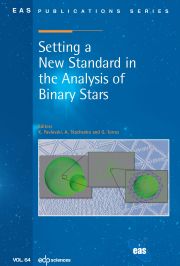No CrossRef data available.
Article contents
On Stellar Dynamo Processes and Differential Rotation
Published online by Cambridge University Press: 17 November 2003
Abstract
Many stars exhibit strong magnetic fields, some of which are thought to be of primordial origin and others a sign of magnetic dynamo processes. We briefly review the results of observational studies of solar-type stars seeking to evaluate the linkage between rotation rate and possible magnetic cycles of activity. Clearly turbulent convection and rotation within spherical shell geometries provide ingredients essential for dynamo action. However, intensive efforts over several decades in solar research have demonstrated that it is no easy matter to achieve cyclic magnetic activity that is in accord with observations. Helioseismology has revealed that an essential element for the global solar dynamo is the presence of a tachocline of shear at the base of the solar convection zone, leading to the likely operation of an interface dynamo. We review the crucial elements for achieving a cyclic magnetic activity. We then discuss some of our current 3-D MHD simulations of solar turbulent convection in spherical shells that yield differential rotation profiles which make good contact with some of the helioseismic findings. We show that such turbulent motions can amplify and sustain magnetic field in the bulk of the convective zone whose strength are sufficient to feed back both upon the convection and its global circulations.
- Type
- Research Article
- Information
- Copyright
- © EAS, EDP Sciences, 2003




